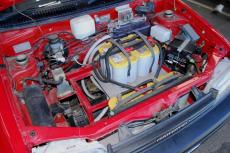DIY Electric Cars!
 Last weekend I attended an electric car show. Organised by the Sydney branch of the Australian Electric Vehicle Association, it was unlike any other car show I’ve ever been to.
Last weekend I attended an electric car show. Organised by the Sydney branch of the Australian Electric Vehicle Association, it was unlike any other car show I’ve ever been to.
Why?
Well, firstly, the cars were different to 99 per cent of vehicles on the road. With the exception of a few current model Prius Toyotas, they were all home-converted battery electric vehicles. That’s right, (mostly) road-registered and street driven, these cars never visited petrol stations but instead needed only to be plugged into mains power.
Another thing rather different about the show was the interest being shown by visitors.
At a typical car sow you’ll get lots of lookers but few talkers. Here, every visitor had dozens of questions – and some even came equipped with notebooks and were writing down the answers. One guy had come all the way from Canberra and was actively seeking the information to enable him to have a car converted to electric power for his daily commute.
Others were asking about conversion costs, battery life, range, performance – and everything else you could imagine.
There was a constant buzz of interested conversation.
Along with the road-registered cars, there was also an electric kart, a half-built electric clubman and an electric motorbike. The road vehicles included a Camry wagon, Daihatsu Charade, Hyundai Excel, Daewoo Lanos and even a Mazda ute.
I was attending the show to gather material for some AutoSpeed stories, and got to drive three of the cars. We’ll be running these stories in due course, but in the mean time, if you’re at all interested in building your own battery electric car – or having a car converted to battery electric power – be aware that there’s a bunch of very enthusiastic and helpful people available to you as a resource.

 Julian Edgar, 50, has been writing about car modification and automotive technology for nearly 25 years. He has owned cars with two, three, four, five, six and eight cylinders; single turbo, twin turbo, supercharged, diesel and hybrid electric drivelines. He lists his transport interests as turbocharging, aerodynamics, suspension design and human-powered vehicles.
Julian Edgar, 50, has been writing about car modification and automotive technology for nearly 25 years. He has owned cars with two, three, four, five, six and eight cylinders; single turbo, twin turbo, supercharged, diesel and hybrid electric drivelines. He lists his transport interests as turbocharging, aerodynamics, suspension design and human-powered vehicles.

on November 7th, 2007 at 1:51 pm
I was there as well, there were certainly some well-built conversions there (the Charade with the Zilla gear stood out for me), as well as an interesting comparison between the earlier and latest technology. I think the barrier is not so much the range, but the costs involved with the conversion.
on November 8th, 2007 at 12:05 pm
Yeah there is a pretty big initial cost for doing a conversion. Looks like about $10 000 for a standard DIY lead-acid battery conversion and probably double that to get lithium Ions. But your going to get a lot of that back in petrol and servicing savings. One of the guys at the show said you can get 8 years out of the batteries if you look after them so you would only cost about $500 per year to replace them every 8. Charging apparently costs just over a dollar per charge so lets say $350 per year on ‘fuel’. The average person spends about $50 per week on fuel and i would guess at least $1000 on servicing. So that is $3600 a year for an ICE car and $850 for an electric. That is an $11000 difference over just 4 years. Consider a conversion an investment rather than a loss.
on November 8th, 2007 at 7:47 pm
I don’t think the cost would matter much at all… IF the cars had much bigger range and more performance.
And note: be wary about what people say is the battery life – one guy told me the batteries weren’t half as good as when they were near new…
But it’s very interesting stuff indeed, and with new battery technologies, a lot will change in the next few years.
on November 9th, 2007 at 11:47 am
There will still be running costs for an electric car beyond electricity and battery replacement. Oil change etc in ICE is a small part of servicing. No doubt the cars are heavier as well.
I do look forward to the high torque fun of an electric vehicle when they become mainstream.
Matt said recharging only cost a bit over $1. That’s probably 10kWhr’s or so. Like running a medium size split air-cond unit for four hours for each car you are recharging. So each night when you get home and plug in and add to the peak load already on the electricity distribution network, just as the afternoon wind dies down at the wind farm, and the sun goes down at the solar farm. The peak load just got higher again. Can green power keep up with the demand for more electricity consumption?
Exciting times ahead…
on November 13th, 2007 at 4:01 pm
This “bunch of very enthusiastic and helpful people available to you as a resource”…. do you have contact details?
on November 13th, 2007 at 4:07 pm
The URL is in the article. It was a display from the Sydney branch that I saw.
on January 23rd, 2008 at 5:59 pm
http://sydneyaeva.googlepages.com The next meeting will be on tuesday, 5th february 2008 at 7:30pm. It will be held at the Ettamogah Pub, cnr Windsor and Merriville Roads, Kellyville (upstairs meeting room). Hope to see you there.
on April 18th, 2008 at 2:01 am
It’s good to hear BP & GM talk about alternative fuels, but 50 years to implement is too long.
http://money.cnn.com/2008/03/05/news/companies/bigoil_hydrogen/index.htm
Perhaps this link will spark more attention:
http://www.chevrolet.com/electriccar/
It is GM’s electric concept car the Chevy Volt. If more people begin to demand alternative fuel cars, we should be able to speed the rate at which the technology is developed.
We have started an Investor Forum where Investors can meet and discuss topics like this:
http://investor-forum.thesubway.com/
on April 20th, 2008 at 1:36 am
I never tire of reading this article, I definately want to convert a car in the not too distant future.
on July 5th, 2008 at 3:13 pm
Anyone interested in doing an EV conversion in Townsville? I’d like to give it a go, but I am a little daunted by the cost.
on October 30th, 2008 at 10:27 am
I realise I’m about a year late with this comment but I went to this EV show too and was disappointed to be honest. Every single car there ran low power brushed DC, as you say through a full gearbox and only one wasn’t running lead acid batteries.
I don’t want to knock their efforts but it’s all about 10 years behind the current technology. EVs with Li-ion powered 3 phase AC can quite easily blow off 650hp super cars with only 220hp and have regen that can extend range by up to 50% (ie doubles its range) Try up to 500km range on $5.00 and 0-100 in 3 seconds!
on October 30th, 2008 at 10:33 am
Sure, but where was your electric car, Paul? I didn’t see it at the show. People who have actually done something should always be respected more than people who say how they’d do things – but don’t have anything to show.
on November 2nd, 2008 at 12:22 am
Julian, I think it’s a little unfair to reject Paul’s comment on the grounds that he hasn’t built (and probably can’t afford to build) the ultimate electric car. I think what he means is that when one goes to a mainstream car show, there is an expectation that at least one of the cars on display will be far above and beyond the normal standard of modified cars in some aspect. If I went to a car show and saw only a bunch of average street cars I would be very disappointed. I am much happier to see a 1200hp dyno car or a hopping lowrider which can jump a metre high or a car with a flawless $50,000 paint job, etc. I could not afford to build these cars and probably wouldn’t want to do so anyway, but it is nice to see something extreme and spectacular at a show. If there was nothing especially exciting then it is really more of an electric car convention rather than a show. Surely there must be at least one eco-minded millionaire in Australia willing to build a car like the one Paul describes?!
on November 2nd, 2008 at 8:22 am
I didn’t ‘reject’ his comment – I published it.
Any car show featuring only electric cars is hardly a ‘mainstream car show’.
The cars at that show were the work of grassroots amateurs building what they could build, clearly on a budget. The cars were registered, being driven on the road. These people hadn’t just talked about it – they’d gone out and done it.
The web is full of people who just talk, and many people who talk with the airy confidence of experts. But anyone can talk about what they’d like to see. It’s the people who don’t just talk that make it happen.
To describe the most advanced electric road cars in the world – ones that are not even available in this country – in the same breath as talking about DIY, home-built cars, simply displays ignorance of realities.
on November 2nd, 2008 at 11:05 pm
Julian, I agree completely with all of your points about how a humble home-built car which works and exists is far better than an imaginary dream car. I also agree that an electric car show is far from the mainstream. What I was trying to say was that for someone coming directly from a background of mainstream car shows, possibly Paul, into what I will describe as an EV expo, I can understand that there may be some disappointment at the lack of speed, noise, money and shiny bodywork. I would have loved to go to that show and see what DIY EVs can currently achieve, but I don’t think it can be called a show in the traditional sense of show cars and show judging. The attitude sounds much friendlier and more low-key, similar to the informal car shows at the start and finish points of certain American car cruises here in Adelaide, where owners are usually happy to tell you all about the car. This is a much nicer atmosphere to learn about cars but I can understand that much of the glitz and glamour would have been missing. Perhaps in a few years’ time with corporate sponsorship the EV shows will also become glitzy, glamorous and impersonal just like their more traditional counterparts!
on November 3rd, 2008 at 8:57 am
Paul, I think there’s a major difference in the effort / expense required to take ‘DIY EV’s’ to the next level. For a conventional car show, parts and expertise are ubiquitous; add in a bit of machismo and you get some great results. To field your ‘current-tech’ EV would generally require more cash, negotiations with suppliers to secure use of their technology, and you would also need to know an awful lot to implement it well.
Also, can you please tell me what the peak torque density (Nm/kg), spinning losses at highway speeds (~1000rpm), and cost for your wheel motor is? I might just buy a pair.